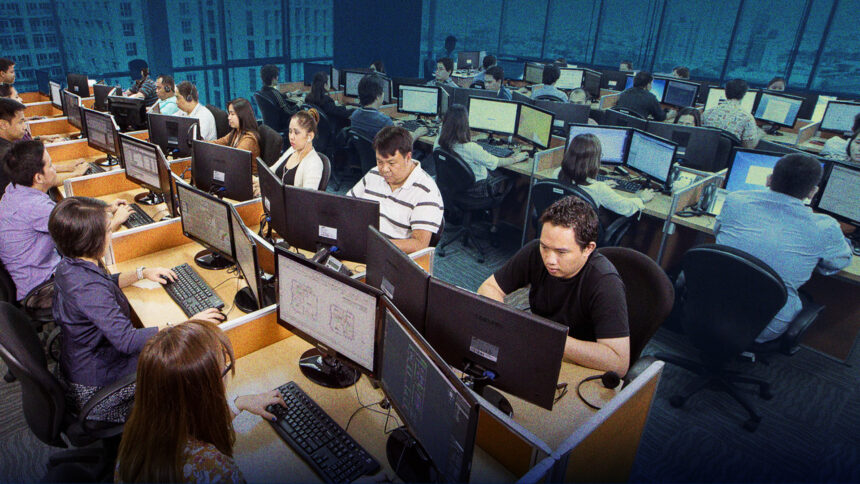BPO agents, with over 1.6 million Filipinos employed, are a popular choice due to their high-demand and decent pay. With the rapid evolution of technology, AI is increasingly being used across various sectors, including daily lives, education, and workforce. This poses a threat to BPO agents, as AI can automate tasks like billing inquiries, FAQs, password resets, and data processing. As a result, companies are integrating AI into their workforce to address the growing demand for skilled and knowledgeable BPO agents.
AI is set to dominate the workforce in the years, particularly in the BPO industry due to its cost-effectiveness and ease-of-work it offers, according to a study conducted by Institute for Public Policy Research.
The Philippines’ flourishing industry
It was in the 1990s when BPO first started its takeoff when multinational companies began exploring outsourcing as a strategy to reduce operational costs. Over the decades, the sector has gone from basic data-entry services to a comprehensive suite of voice and non-voice services.
Fast forward to 2023, the BPO industry in the country earned $29.5 billion in revenue–according to research conducted by Everest Group, making the Philippines on the 5th spot for most number of inquiries according to Outsource Accelerator.
The BPO industry continues to expand with over 1,000 companies all over the country, it is no-brainer that the Philippines is one of ASEAN’s outsourcing hubs that delivers exceptional value globally, according to Srkay Consulting Group.
The threat
AI offers various services such as AI voice assistants, chatbots, and automated customer services, which are rapidly transforming the global outsourcing industry. These AI services are capable of handling simple queries—billing, password resets, and FAQs without any human being involved.
Bart Edes, a fellow and policy analyst at the Asia Pacific Foundation of Canada, said in a policy paper in October last year that the growing use of AI technologies threatens employment in the industry as many BPO workers risk job losses as AI increasingly automates customer support tasks, including individuals who perform voice-based services and write social media and market content.
“AI-driven technologies, including virtual assistants, chatbots, and automated customer service platforms, have begun to take over tasks previously handled by humans, especially for routine customer inquiries and screening and directing customers’ calls. Indeed, the rapid adoption of chatbots to answer common questions threatens to suppress demand for entry-level customer service representatives,” he pointed out.
He noted that AI tools can now engage with users worldwide without any language barriers, eroding the Philippines’ competitive advantage of an English-speaking workforce and diminishing the advantages of companies’ outsourcing their services to another country.
AI can also have the ability to remove the accent or translate what the caller is saying for other nations to expand in the voice sector even if they don’t speak English or have an accent—making it a tough competition for the country in the voice sector.
Despite these threats, CCAP is not too worried yet about the dominance of AI because of the general attitude of empathy and Filipino’s work ethics.
Filling the gaps
AI can bring more roles to the BPO industry. It can provide solutions benefiting the company. According to Unity Solutions, AI can improve operational efficiency that can help speed up back-end tasks that delays customer-facing and administrative functions that support business operations.
“This age of AI and technology brings about new roles. For example cybersecurity professionals or AI analysts, designers, AI coaches, or even prompters,” CCAP President Haidee Enriquez stated
It can also solidify data recording and analysis since AI-powered tools can extract, organize, and analyze vast amounts of data—taking it from patterns and trends, they can provide valuable insights for business forecasting, decision-making, and process improvements.
Still in need of a human
However, still needs humans to move forward. According to a study, AI will enhance jobs in ways previously unimaginable, and more professionals will initiate in leveraging, designing, developing, and producing AI.
According to Unity Connect, companies who will integrate AI in their workforce will need more people skilled in programming, data analytics and similar areas. They will also see a growing demand in user interface design, customer experience design, and other specialities that require creativity.
Moreover, AI doesn’t have emotions. Companies will still hire people who can step up in case AI can’t do its job. Humans are better at handling complex problems and have better empathy and understanding when it comes to situations—this urges employees to upskill their expertise and skills required for BPO work to maintain competitiveness in the industry.
Integrating AI in the workforce doesn’t necessarily mean they are stripping off what humans can do. With ethical use of technology, we can work hand-in-hand with AI on how to grow our business and drive the economy to move forward.








